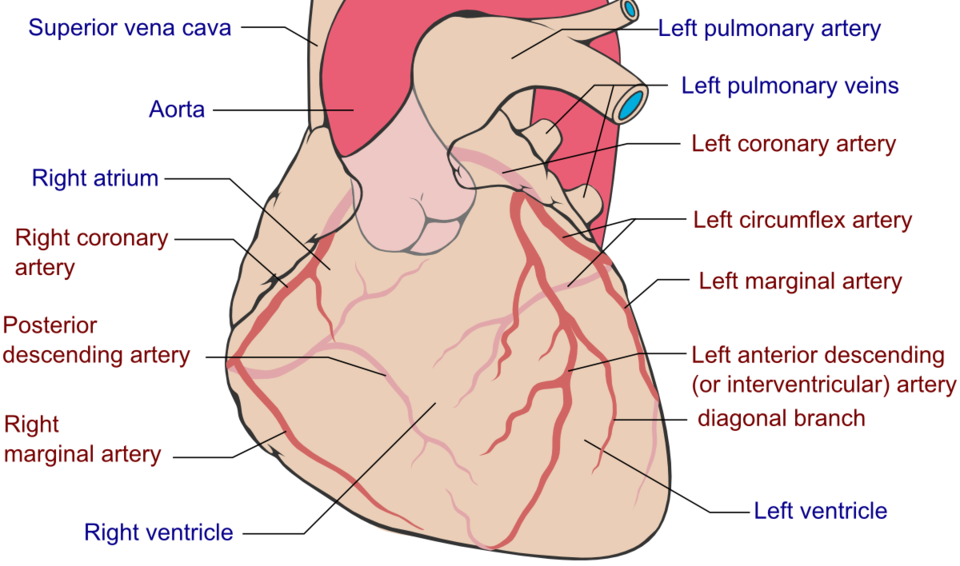Cardiology > Endomyocardial Fibrosis
Endomyocardial Fibrosis
Empty
1. Knuuti J, Wijns W, Saraste A, Capodanno D, Barbato E, Funck-Brentano C, et al. 2019 ESC Guidelines for the diagnosis and management of chronic coronary syndromes. Eur Heart J. 2020;41(3):407-477.
PMID: 31504439
DOI: https://doi.org/10.1093/eurheartj/ehz425
2. Fihn SD, Gardin JM, Abrams J, Berra K, Blankenship JC, Dallas AP, et al. 2012 ACCF/AHA/ACP/AATS/PCNA/SCAI/STS guideline for the diagnosis and management of patients with stable ischemic heart disease. J Am Coll Cardiol. 2012;60(24):e44-e164.
PMID: 23182125
DOI: https://doi.org/10.1016/j.jacc.2012.07.013
3. Khan MA, Hashim MJ, Mustafa H, Baniyas MY, Al Suwaidi SKBM, AlKatheeri R, et al. Global epidemiology of ischemic heart disease: Results from the Global Burden of Disease Study. Cureus. 2020;12(7):e9349.
PMID: 32742886
DOI: 10.7759/cureus.9349
4. Ibanez B, James S, Agewall S, Antunes MJ, Bucciarelli-Ducci C, Bueno H, et al. 2017 ESC Guidelines for the management of acute myocardial infarction in patients presenting with ST-segment elevation. Eur Heart J. 2018;39(2):119-177.
PMID: 28886621
DOI: https://doi.org/10.1093/eurheartj/ehx393
5. Amsterdam EA, Wenger NK, Brindis RG, Casey DE Jr, Ganiats TG, Holmes DR Jr, et al. 2014 AHA/ACC guideline for the management of patients with non–ST-elevation acute coronary syndromes. J Am Coll Cardiol. 2014;64(24):e139-e228.
PMID: 25260716
DOI: https://doi.org/10.1016/j.jacc.2014.09.017
Background
Endomyocardial Fibrosis (EMF) is a restrictive cardiomyopathy characterized by fibrotic thickening of the endocardium, predominantly affecting the apical and inflow regions of one or both ventricles. This results in impaired ventricular filling, leading to diastolic dysfunction, atrioventricular valve regurgitation, and eventual heart failure.
II) Classification/Types
By Ventricular Involvement:
- Left Ventricular EMF
- Right Ventricular EMF
- Biventricular EMF
By Etiology (Proposed):
- Idiopathic EMF: Most common, often endemic to certain regions.
- Secondary EMF: Associated with hypereosinophilic syndromes, parasitic infections, or autoimmune conditions.
By Stage:
- Early Stage: Subclinical or mild symptoms
- Intermediate Stage: Fibrosis and restrictive physiology begin
- Advanced Stage: Severe restriction, heart failure, and valve regurgitation
III) Pathophysiology
EMF involves chronic inflammation leading to progressive fibrosis of the endocardium, typically starting at the ventricular apex and progressing toward the base. This fibrosis traps the chordae tendineae and impairs valve mobility, leading to atrioventricular valve regurgitation. The restricted ventricular compliance impairs diastolic filling, increases venous pressures, and causes systemic or pulmonary congestion depending on the ventricle involved.
IV) Epidemiology
- Sex: Slight male predominance
- Age: Typically affects children and young adults
- Geography: Endemic in tropical regions, particularly sub-Saharan Africa, India, and South America
- Comorbidities: Eosinophilia, parasitic infections (e.g., filariasis, schistosomiasis), malnutrition
Etiology
I) Causes
- Idiopathic (most common in endemic regions)
- Hypereosinophilic syndromes
- Parasitic infections (e.g., schistosomiasis, filariasis)
- Autoimmune diseases (e.g., Churg-Strauss)
- Malnutrition (low protein diets, cassava consumption)
- Genetic predisposition (under investigation)
II) Risk Factors
- Living in endemic tropical areas
- Chronic parasitic infections
- Eosinophilia
- Poverty and malnutrition
- Children and young adults
Clinical Presentation
I) History (Symptoms)
- Progressive dyspnea on exertion
- Orthopnea and paroxysmal nocturnal dyspnea (left-sided EMF)
- Ascites and peripheral edema (right-sided EMF)
- Fatigue, reduced exercise tolerance
- Palpitations (often due to atrial fibrillation)
- Weight loss in chronic cases
II) Physical Exam (Signs)
Vital Signs:
- Normal or low blood pressure
- Tachycardia
Cardiac Exam:
- Loud S3 or S4
- Murmur of mitral or tricuspid regurgitation
- Jugular venous distention
Pulmonary:
- Basal rales (left EMF)
- Signs of pulmonary hypertension
Peripheral:
- Ascites, hepatomegaly (right EMF)
- Pedal edema
- Cachexia in advanced cases
Differential Diagnosis (DDx)
- Restrictive cardiomyopathy (e.g., amyloidosis, sarcoidosis)
- Constrictive pericarditis
- Rheumatic mitral or tricuspid regurgitation
- Dilated cardiomyopathy
- Right heart failure due to pulmonary hypertension
- Tropical endomyocarditis
Diagnostic Tests
Initial Tests:
Transthoracic Echocardiogram (TTE):
- Apical fibrosis with obliteration of ventricular apex
- Atrioventricular valve regurgitation (mitral or tricuspid)
- Enlarged atria with preserved ventricular systolic function
- Diastolic dysfunction with restrictive filling pattern
Electrocardiogram (ECG):
- Low voltage QRS
- Atrial fibrillation or flutter
- Nonspecific ST-T changes
Chest X-ray:
- Cardiomegaly
- Pulmonary congestion (left EMF)
- Right atrial and ventricular enlargement (right EMF)
Cardiac MRI:
- Confirms endocardial thickening and fibrosis
- Better tissue characterization than echo
Laboratory Tests:
- Eosinophilia (often transient)
- Elevated BNP in advanced heart failure
- Rule out parasitic infections (stool ova and parasite, serologies)
Endomyocardial Biopsy:
- Definitive diagnosis but rarely performed due to risk
Cardiac Catheterization:
- Diastolic pressure equalization in both ventricles
- Elevated filling pressures
- Confirms restrictive physiology
Treatment
I) Medical Management
Heart Failure Management:
- Diuretics for fluid overload
- Salt restriction
- Aldosterone antagonists (e.g., spironolactone)
Rate Control and Anticoagulation:
- Beta-blockers or calcium channel blockers for atrial fibrillation
- Anticoagulation if atrial fibrillation or intracardiac thrombus present
Anti-inflammatory/Eosinophil Control (in early stage):
- Corticosteroids if eosinophilia present
- Antiparasitic agents if underlying infection is confirmed
II) Interventional/Surgical
Endocardial Decortication and Valve Repair/Replacement:
- Indicated in advanced disease with symptomatic valve regurgitation and restrictive physiology
- May improve symptoms and reduce atrial pressures
- High perioperative risk in advanced cases
Patient Education, Screening, Vaccines
- Educate about symptoms of worsening heart failure
- Encourage adherence to diuretics and follow-up visits
- Emphasize importance of antiparasitic treatment if applicable
- Nutritional counseling to prevent malnutrition
- Avoid strenuous physical activity
Vaccinations:
- Influenza annually
- Pneumococcal vaccine
- COVID-19 vaccination
Consults
- Cardiology: All suspected or confirmed cases for diagnostic evaluation and long-term management
- Cardiothoracic Surgery: For surgical planning in advanced EMF
- Infectious Disease: If parasitic or eosinophilic etiology suspected
- Nutritionist: To address dietary deficiencies
- Primary Care/Internal Medicine: For comprehensive chronic disease management
Follow-Up
- Echocardiography:
- Every 6–12 months to assess progression of fibrosis and valve function
- ECG monitoring:
- To detect new-onset arrhythmias
- Functional Assessment:
- NYHA classification at each visit
- Medication Review:
- Adjust diuretics, anticoagulation, and rate control agents
- Reinforce Education:
- Fluid restriction, signs of decompensation, and adherence
Recommended
- Myocarditis
- Dilated cardiomyopathy
- Hypertrophic Cardiomyopathy
- Restrictive cardiomyopathy
- Alcoholic Cardiomyopathy
- Peripartum (Postpartum) Cardiomyopathy (PPCM)
- Takotsubo (Stress) Cardiomyopathy (Broken Heart Syndrome)
- Cardiac cirrhosis (congestive hepatopathy)
- Cocaine-Related Cardiomyopathy
- Endomyocardial Fibrosis
- Cardiac amyloidosis
- Myopathies
- Postpericardiotomy Syndrome

Stay on top of medicine. Get connected. Crush the boards.
HMD is a beacon of medical education, committed to forging a global network of physicians, medical students, and allied healthcare professionals.
